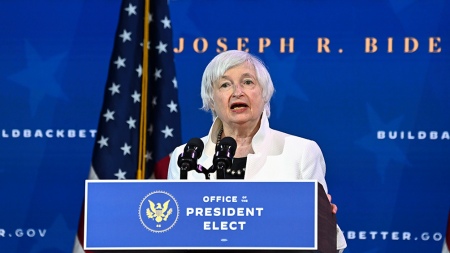US Treasury Secretary Janet Yellen called on the US Congress to act “in a timely manner” to “increase or suspend” the federal debt limit as otherwise the US will default.
In the United States, by the Constitution, all types of debt taking must be authorized by Congress, and since 1917, and due to the haste of the expenses of the First World War, Parliament by law modified the method establishing a ceiling in the amount of debt the country can take on.
The United States periodically reaches this limit, which usually requires a bipartisan agreement (Democrats and Republicans) to increase it or temporarily suspend it.. Otherwise, it would fall into default and, therefore, consequences such as a financial crisis and a recession, a situation that it never reached in its history.
The last time Congress had to increase the debt limit was at the end of 2021.
In 2011, during the presidency of Barack Obama, the lack of agreement led to the rating agency S&P reducing the country’s debt rating from “AAA” –the highest grade- to “AA+” in an unprecedented way.
The last time Congress had to increase the debt limit was at the end of 2021, when the country escaped default for four days due to the impasse between the ruling party and the opposition.
back then, the limit was increased by US$2.5 trillion, allowing the ceiling –which is still in force- to be US$31.4 trillion.

Right now, the government is only US$78 billion away from reaching that figure, which, Yellen pointed out, motivated her area to start taking emergency accounting measures starting next Thursday to prolong reaching the limit, a shortcut which, however, cannot be extended for a long time.
“The period of time that these emergency measures can last is subject to considerable uncertainty,” the secretary said in a letter sent to the Democratic and Republican leaders in the Capitol, released by the Bloomberg agency, although she maintained that “it is unlikely that the money and emergency measures run out before the beginning of June.”
The Democrats argue that Congress, during the term of Republican Donald Trump, allowed the ceiling to be increased without delays and conditions.
The political battle over the debt issue is expected to be fierce between Republicans and Democrats, especially given the fact that, since last year’s midterm elections, Republicans have gained control of the House of Representatives with Democrats maintaining their hegemony. in the Senate.
Republicans insist that the only way they would pass raising the debt ceiling is by cutting spending, something President Joe Biden’s party rejects.

The Democrats argue that Congress, during the term of Republican Donald Trump, allowed the ceiling to be increased without delay and conditions.
According to Yellen, the Treasury’s emergency measures will include the suspension of investments from various pension funds.
“It is critical that Congress act in a timely manner to increase or suspend the debt limit. If government obligations are not paid, irreparable damage will be done to the US economy, the lives of all Americans, and global financial stability,” he warned.
Republicans insist that the only way they would pass raising the debt ceiling is by cutting spending, something President Joe Biden’s party rejects.
According to Wall Street analysts, the country is at risk – in the absence of a political resolution – of falling into default in the second half of the year, at which time the emergency measures will be exhausted.
“It is a sacred obligation to maintain the trust and credit of the United States, and Congress must handle the cap question, without gambling and without putting our economy at risk,” warned the director of the White House National Economic Council, Brian Deese.
Lawrence Summers, former Treasury secretary from 1999 to 2001 under Bill Clinton, said Thursday that the debt ceiling disputes are “among the stupidest” in Washington.and warned that “a default would be a catastrophe since it would imply higher debt costs forever.”
The former official also opined that, despite the moderation of inflation and other positive economic data, the country “is more likely to enter a recession this year than not.”
















